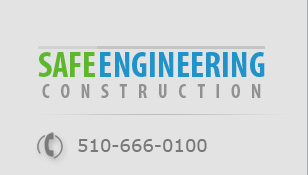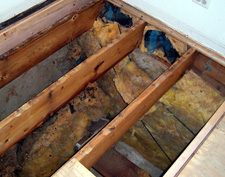
(510) 666-0100

| FOUNDATION RETROFIT |
| RETAINING WALL |
| EARTHQUAKE RETROFIT |
| SOFT STORY RETROFIT |
| GARAGE |
| ADDITION |
| NEW CONSTRUCTION |
| FLOOR RE-LEVELING |
| STRUCTURAL REPAIR |
| DECK REPAIR |
| DRAINAGE |
| AREA OF SERVICES |

Crawl Space Mold and Moisture
High humidity levels inside crawl spaces cause moisture and condensation. Cool surfaces such as wood, concrete, and metal will gather water vapor condensing out of the air. This moisture will saturate the materials, causing rot, rust, odors, and mold growth. The moisture will provide perfect nesting conditions for critters, such as termites, ants, rodents, crickets, beetles, spiders, and countless others. Moisture is the prime factor that causes structural damage. Over time, this moist environment damages wood framing, steel structural members and costs you money in replacement.
Crawl Space Insulation in CA
 Crawl space insulation is a helpful way to protect the inside of your home from outside air and keep it warmer in cold winter months. Insulating your crawl space can be difficult, but with the right products and the right help the job can be completed quickly and correctly. But before you jump right in and start installing fiberglass insulation in the crawlspace, doing some research on insulation materials may help you make the best decisions for your crawl space insulation.
Crawl space insulation is a helpful way to protect the inside of your home from outside air and keep it warmer in cold winter months. Insulating your crawl space can be difficult, but with the right products and the right help the job can be completed quickly and correctly. But before you jump right in and start installing fiberglass insulation in the crawlspace, doing some research on insulation materials may help you make the best decisions for your crawl space insulation.
Sub-surface French Drain solution:
An effective drainage system is a sub-surface french drain pipes around the house. These drain ppes capture sub-surface water and direct it away from the foundation. Drainage system need trenches, pipes and correct placement of drain pipes for a good drainage system.
The French drain system will work wonderfully if the pipe is installed has some slopes downwards. It will not work if you install the pipe so that it slopes uphill. If you pitch the pipe, 1/8 inch per foot or better of fall is sufficient.
French drain pipes must be "daylighted" or expose itself on the lowest portion of the lot. This is where the collected water will discharge. You can often disguise this pipe exit point with decorative gravel, boulders or large rocks. You may also want to plant vegetation that likes to have plenty of water.
The Effective Depth
Linear French drains do not need to be excessively deep to be effective. Remember, water movement through soils happens where there are air voids. In many soils, air is most plentiful in the upper 18 inches.
Install the piping system so that the pipe is level or has a slight downward slope to the discharge point.
The Right Pipe
The pipe used to collect water from the soil must be perforated. Once collected and in transit to the discharge point, you can switch over to solid pipe. Only use perforated pipe in the areas to be drained.
Use PVC pipe that has two rows of holes in it. These holes must point down.
Gravel Fill
Once you have placed the pipe in the trench, fill around the pipe with 1 inch washed gravel to within 1 or 2 inches of the surface. Cover the gravel with a piece of sod. Do not place any dirt in the trench. Water traveling through the soil will find this gravel and immediately fall down to the pipe. The large voids around the 1 inch gravel will accommodate a rapid flow of water.
If you have to bring the trench system to the surface to capture surface water, dig out soil to make a path. Use colored gravel for the path placed around fieldstone or stepping stones.
Feel Free to contact us for a FREE ESTIMATE for a workable drainage system around your house. Keep the water away from the foundation and retaining wall as much as possible. Water and moisture is the worst enemy your foundation could ever have.
You can all us Toll Free at (855) BE-SAFEE or email us at: SafeEngineering@gmail.com










